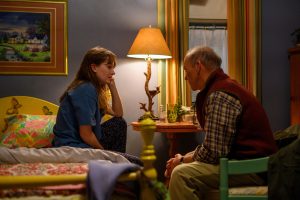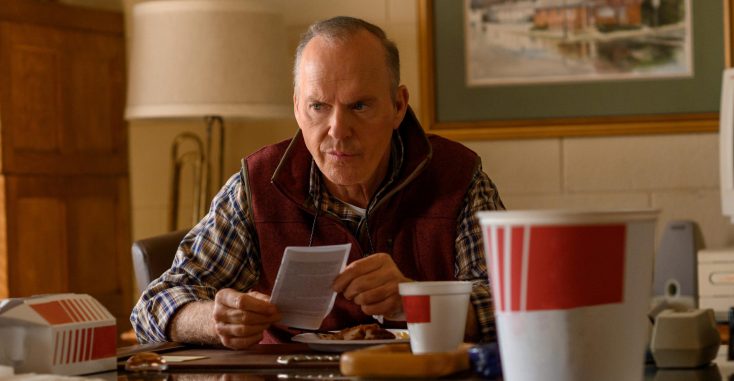
(l-r) Betsy (Kaitlyn Dever) and Dr. Samuel Finnix (Michael Keaton) in DOPESICK. ©Hulu. CR: Antony Platt/Hulu.
By JUDY SLOANE
Front Row Features
HOLLYWOOD—Michael Keaton has enjoyed a long and eclectic acting career, including the successful comedies “Night Shift” and “Mr. Mom,” iconic genre movies, “Batman” and the classic fantasy “Beetlejuice.” More recently, he’s starred in two Academy Award winning motion pictures, “Spotlight” and Birdman.”
The versatile actor now portrays Dr. Samuel Finnix in Hulu’s new drama “Dopesick,” based on Beth Macy’s book “Dopesick: Dealers, Doctors and the Drug Company that Addicted America.” He plays a country doctor who begins prescribing Oxycontin to his patients after being assured by the pharmaceutical rep that it’s not addictive, but soon doubts those assurances as some of his patients become addicted to the powerful opioid.
The eight-episode limited series, written by Danny Strong (“Recount,” “Lee Daniels’ The Butler”), investigates opioid addiction and spotlights how one company sparked the worst drug epidemic in American history. Co-starring along with Keaton are Peter Sarsgaard, Rosario Dawson, Will Poulter and Michael Stuhlbarg.
Michael Keaton spoke via Zoom with members of the TV Critics Association about this disturbing real-life tragedy, which premieres on Hulu on Wednesday Oct. 13.
Q: What surprised you most about this true story?
Michael Keaton: The ease with which it became epidemic knocked me out. It seemed almost too simple that (it) happened this way. Honestly, I’m reading it and thinking, “Is this too on the head?” Then, after you read Beth Macy’s book, and you start to do any kind of research, you realize this is not exaggerated in the slightest. The ease with which all this happened was sickening.
The other thing you learn real fast is how it’s infiltrated every class group. I guess we all think we know that addiction is across the board, but you don’t really know it. You don’t really think it until you start to learn about it, in this particular project, anyway.
Q: You play this quiet, honest doctor who’s from a small town in Pennsylvania—and that’s basically where you’re from. Is he a lot like the people you grew up with?
Keaton: Yeah. I don’t pretend to say, “Oh, yeah, I know these folks,” but I kind of do to some degree, or did. It’s not too far from where I grew up just southwest of Pittsburgh.
Danny (Strong, the writer) and I discussed this. How did he get there? He’s not born in Virginia, but that’s where he chose to go, and he also followed the woman he was in love with and then fell in love with the place and its people, but what you learn is, (this may be the) hotbed of where a lot of these stories take place, but it’s all over. It’s upstate New York, Maine, rural (areas), and even here where I am out West. But I do relate to the doctor’s mission or what he chose and, hopefully, I’m somewhat like him because I think he has a high degree of decency.
Q: You played an addict in “Clean and Sober” in 1988. How do you see this in terms of portraying addiction now? What are the changes over the years that you’ve seen as far as being able to tell stories more freely about the actual depths of addiction and what it does to people?
Keaton: Addiction’s been around since forever, opium addicts, heroin addicts, alcoholism—this is nothing new. “Clean and Sober” was and is, because it’s still out there, for people to watch. I think the awareness now is much greater. Also, the stigma has changed about addiction in general. I thought, “I played that; I did something on that subject.” And then this came up. I (thought), “Do I really want to read this?” I tend to not want to read just anything, but this is societal and has a much larger canvas or bigger story to tell, and the information that’s out there now is greater.
The other thing (is) how it shines a light on white collar America and its guilt. This is a David and Goliath story. You really look at the exponential damage often done by white collar crime compared to some kid out in the country selling a bag of weed to maybe help pay his rent. How do you even compare the two? That has become clearer. When I did “Clean and Sober,” we touched on that, too, by the way. I read enough and I watch enough news, but then, when you do things like this, you’re forced to know and understand things.
Q: There was a time in your business where if you had some success in feature films, you set television aside. But that doesn’t seem to be the case anymore. Why has that changed?
Keaton: Yeah, forget all that now. I did things here and there on television, but not much but, pound for pound, it’s gotten so good over the last 10 years. Quality is quality. When you read something that’s good, it gets real clear, real quick. The words just jump off the page, and this was about something so, for me, it doesn’t matter. I’ve been fortunate to have acted inside a lot of good casts. This was crazy. Everybody (was) really strong, really impressive and they will all tell you it gets easier when you have great material.
Television has a big advantage. It’s hard to nail something in 90 minutes or two hours or two hours and 20 minutes. The beauty of television is you can delve, drill down and develop it over time.
Q: You’ve been on quite a roll with these true-story projects in film and television. Is there something especially fulfilling about portraying these relatively recent true stories and these characters who feel the moral obligation to do the right thing?
Keaton: Well, sure. It’s satisfying because I’m in a fortunate position where what I do for a living affords me an opportunity to possibly change things or affect people in some way. And if you’re talking about “Spotlight” or “Worth” or “9/11” or this; I’m fortunate in that regard. I look at it as a perk to what I’ve chosen to do for a living. I’m not necessarily seeking these things out, but they certainly get my attention.





